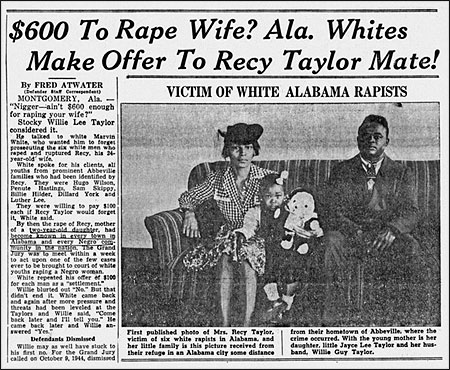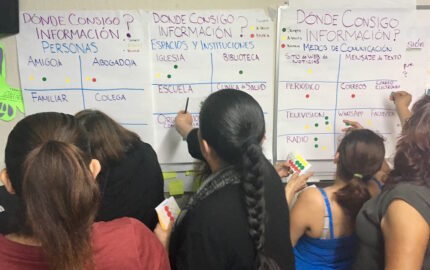Before Rosa Parks refused to move to the back of the bus, she had already been fighting for racial equality for more than a decade. She strategized with other activists, organized protests, and in 1948 gave an impassioned speech that led to her election as secretary of the Alabama conference of the NAACP. In that position, she investigated cases of sexual violence and other crimes against blacks, as she had done for the Montgomery chapter of the NAACP.
Her role in defending the rights of black women is eloquently chronicled in the 2010 book, "At the Dark End of the Street: Black Women, Rape, and Resistance—a New History of the Civil Rights Movement from Rosa Parks to the Rise of Black Power" by Danielle L. McGuire, a history professor at Wayne State University in Detroit, Michigan.
In her meticulously researched book, McGuire maintains that in order to fully understand the civil rights movement one must understand the history of sex crimes against black women and how these attacks were used as a weapon against the fight for racial equality. Being able to sit at a lunch counter or vote didn't mean anything if black women couldn't walk down the street or ride the bus unmolested.
As McGuire writes, "Between 1940 and 1975, sexual violence and interracial rape became one crucial battleground upon which African Americans sought to destroy white supremacy and gain personal and political autonomy. … If we understand the role rape and sexual violence played in African Americans' daily lives and within the larger freedom struggle, we have to reinterpret, if not rewrite, the history of the civil rights movement."

Recy Taylor was abducted and raped at gunpoint by six white men who offered her husband $600 if charges were dropped. Courtesy of The Chicago Defender.
Before Parks achieved fame for her role in the bus boycott, she was known as "someone who could be trusted with delicate or dangerous information," McGuire writes. In 1944 Parks, an investigator for the NAACP, was sent to Abbeville, Alabama to look into the case of Recy Taylor, who at the age of 24 was abducted and raped at gunpoint by six white men. "Taylor's refusal to remain silent helped expose a ritual of rape in existence since slavery, inspired a nationwide campaign to defend black womanhood, and gave hope to thousands suffering through similar abuses," McGuire writes.
While Parks was interviewing Taylor, the deputy sheriff burst into the cabin and ordered the NAACP representative to leave town. Though Parks helped organize a campaign on behalf of Taylor and her case became known across the nation, she failed in her quest to win justice for the young mother.
Eleven years later Parks found a success of historic proportions when she helped organize the Montgomery bus boycott with many of the activists she had met working on the Taylor case. As for Taylor, she received an apology earlier this year from the state of Alabama for its failure to prosecute the crimes.
Her role in defending the rights of black women is eloquently chronicled in the 2010 book, "At the Dark End of the Street: Black Women, Rape, and Resistance—a New History of the Civil Rights Movement from Rosa Parks to the Rise of Black Power" by Danielle L. McGuire, a history professor at Wayne State University in Detroit, Michigan.
In her meticulously researched book, McGuire maintains that in order to fully understand the civil rights movement one must understand the history of sex crimes against black women and how these attacks were used as a weapon against the fight for racial equality. Being able to sit at a lunch counter or vote didn't mean anything if black women couldn't walk down the street or ride the bus unmolested.
As McGuire writes, "Between 1940 and 1975, sexual violence and interracial rape became one crucial battleground upon which African Americans sought to destroy white supremacy and gain personal and political autonomy. … If we understand the role rape and sexual violence played in African Americans' daily lives and within the larger freedom struggle, we have to reinterpret, if not rewrite, the history of the civil rights movement."

Recy Taylor was abducted and raped at gunpoint by six white men who offered her husband $600 if charges were dropped. Courtesy of The Chicago Defender.
Before Parks achieved fame for her role in the bus boycott, she was known as "someone who could be trusted with delicate or dangerous information," McGuire writes. In 1944 Parks, an investigator for the NAACP, was sent to Abbeville, Alabama to look into the case of Recy Taylor, who at the age of 24 was abducted and raped at gunpoint by six white men. "Taylor's refusal to remain silent helped expose a ritual of rape in existence since slavery, inspired a nationwide campaign to defend black womanhood, and gave hope to thousands suffering through similar abuses," McGuire writes.
While Parks was interviewing Taylor, the deputy sheriff burst into the cabin and ordered the NAACP representative to leave town. Though Parks helped organize a campaign on behalf of Taylor and her case became known across the nation, she failed in her quest to win justice for the young mother.
Eleven years later Parks found a success of historic proportions when she helped organize the Montgomery bus boycott with many of the activists she had met working on the Taylor case. As for Taylor, she received an apology earlier this year from the state of Alabama for its failure to prosecute the crimes.




